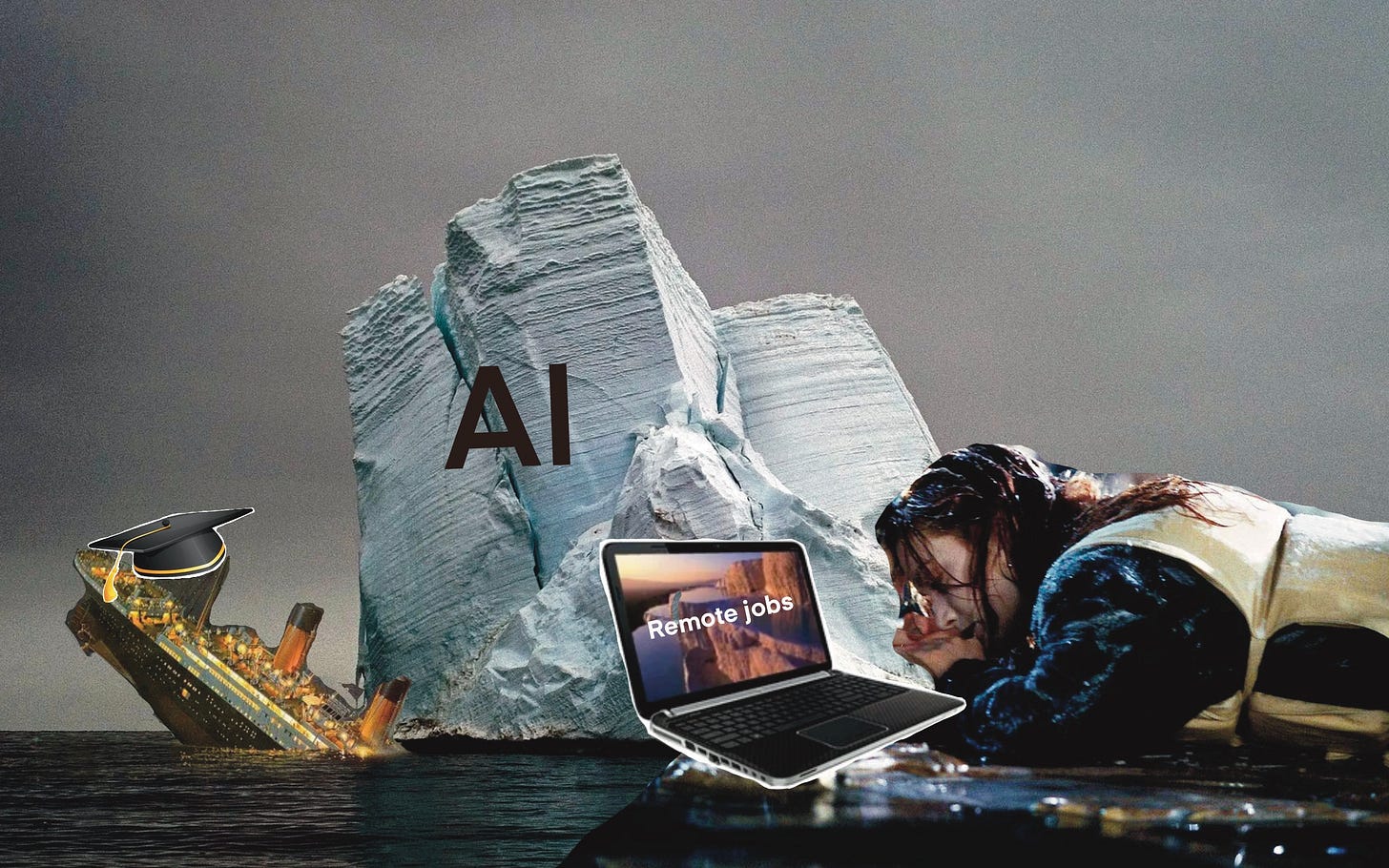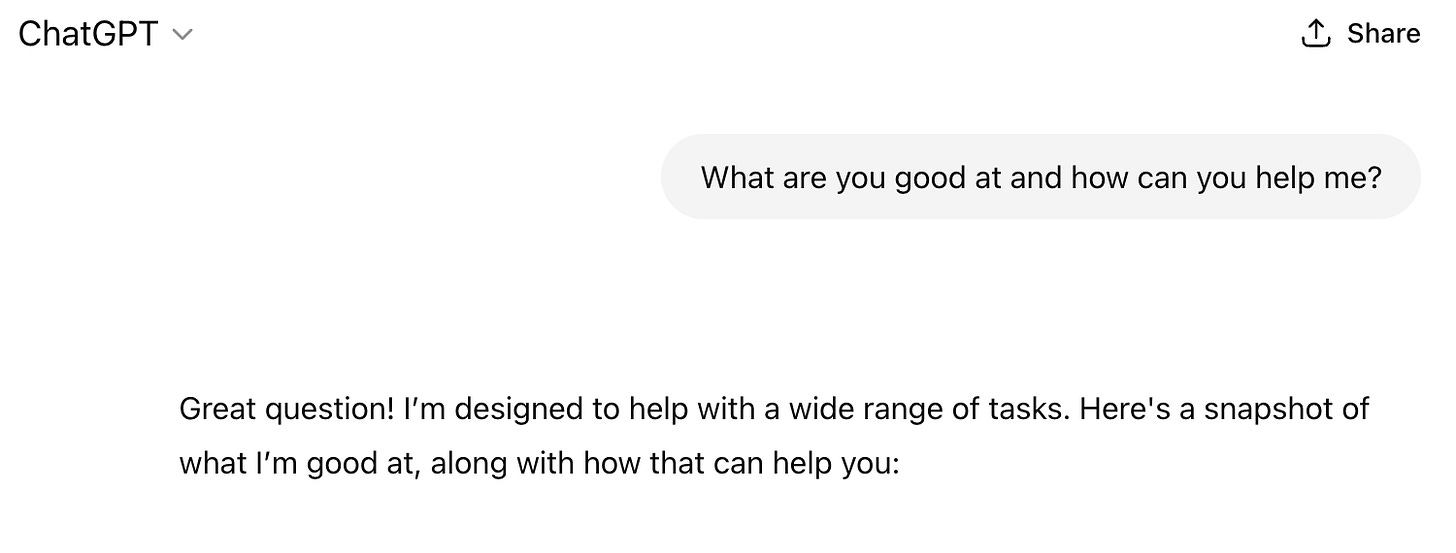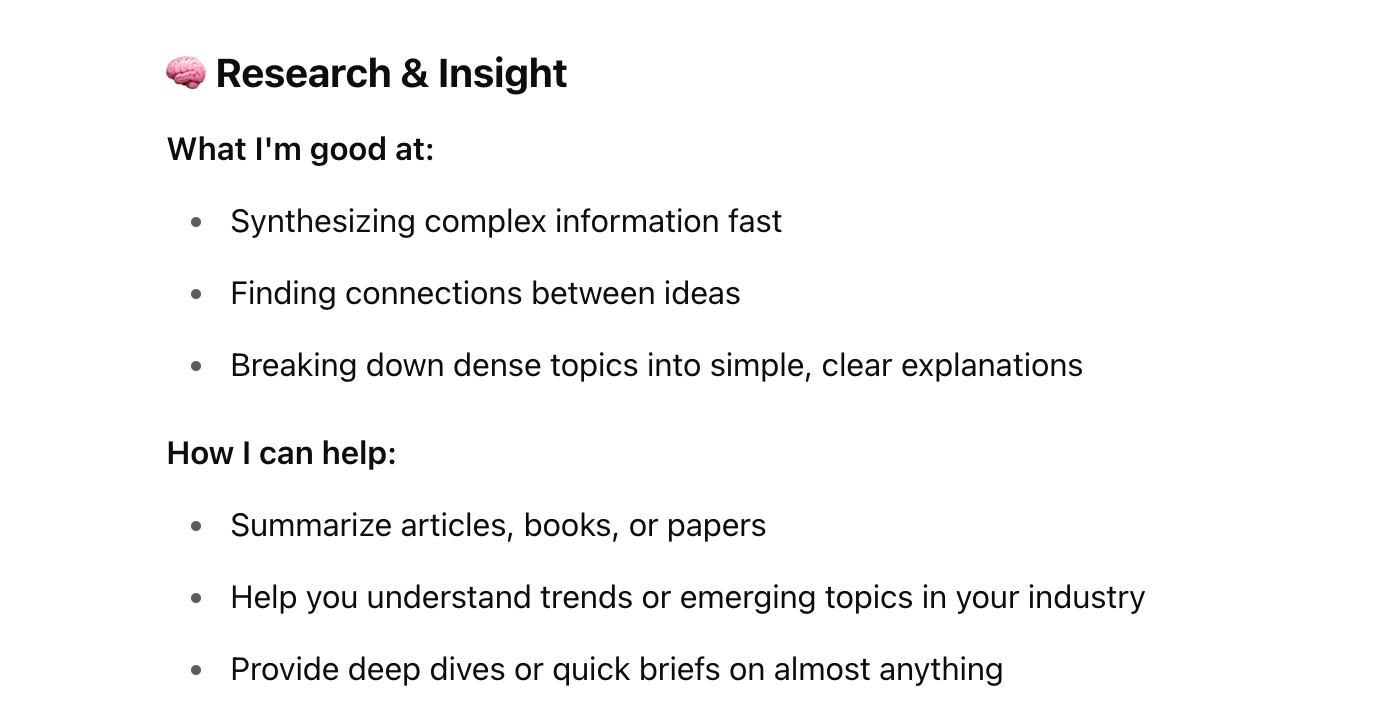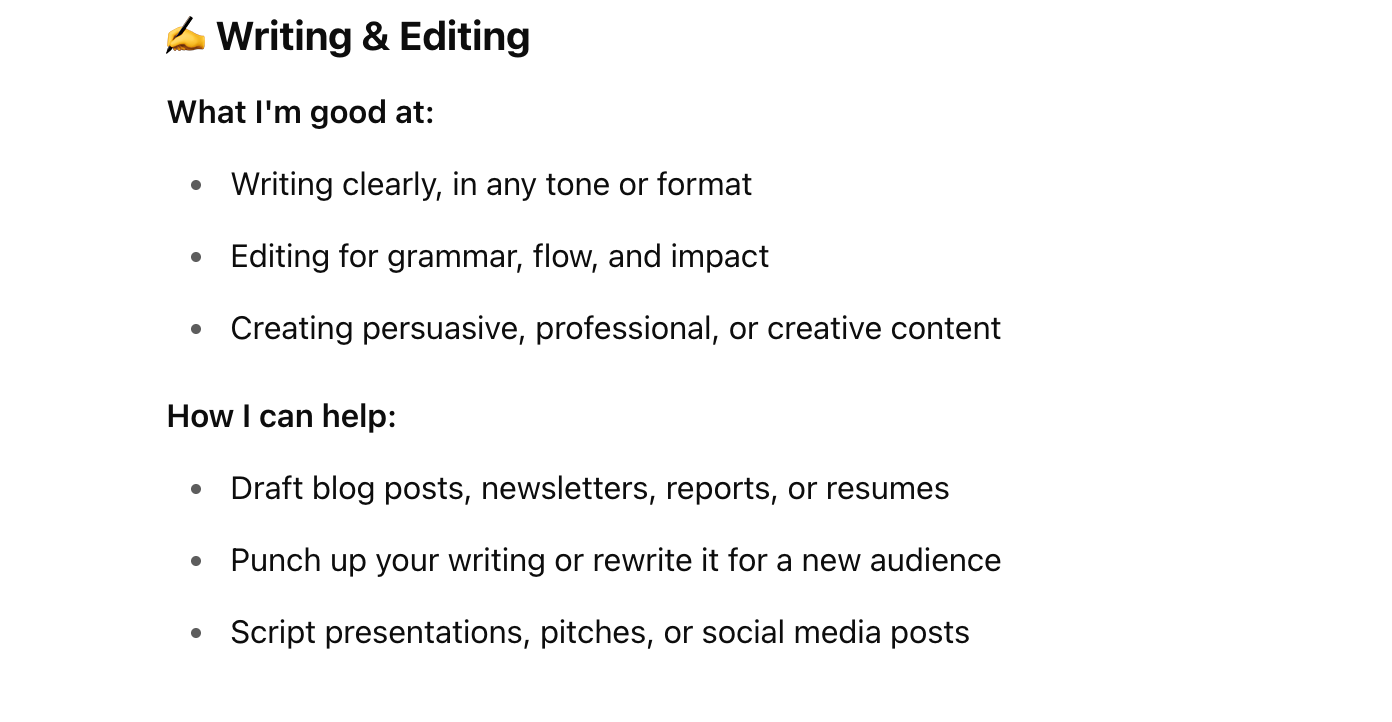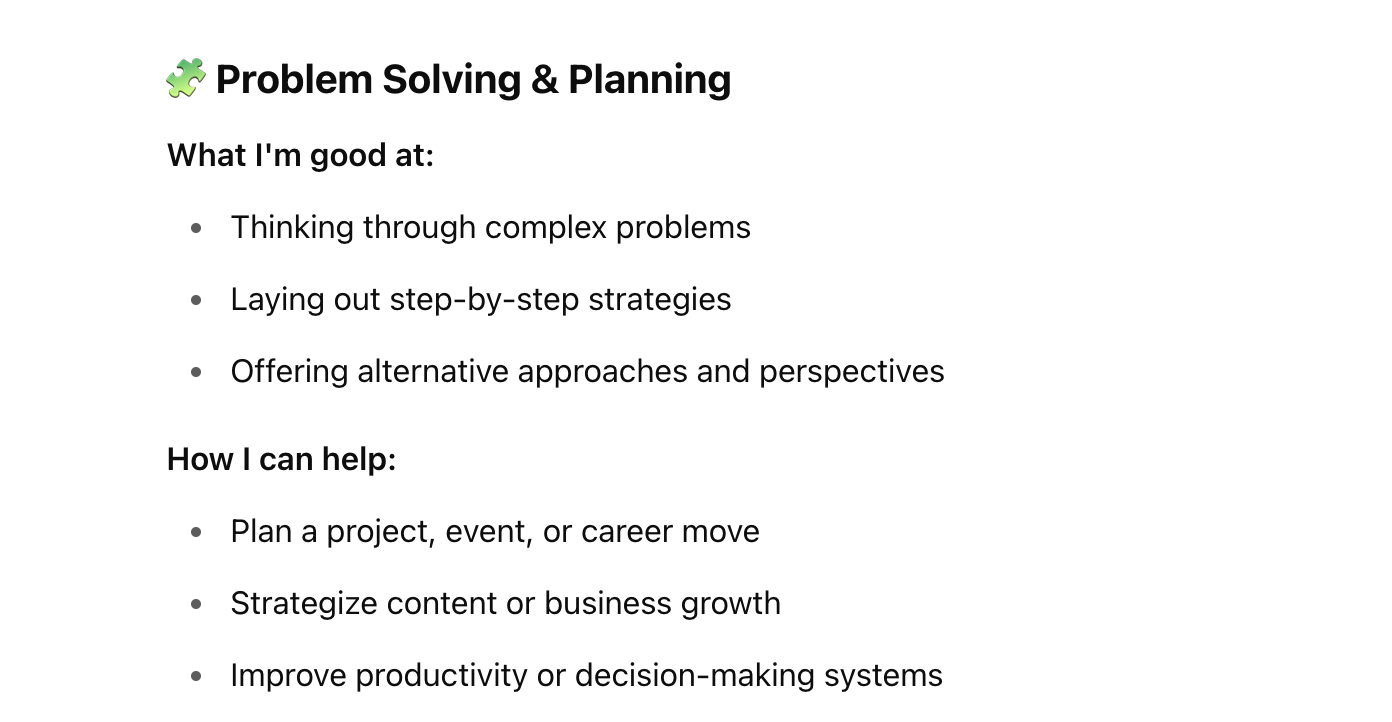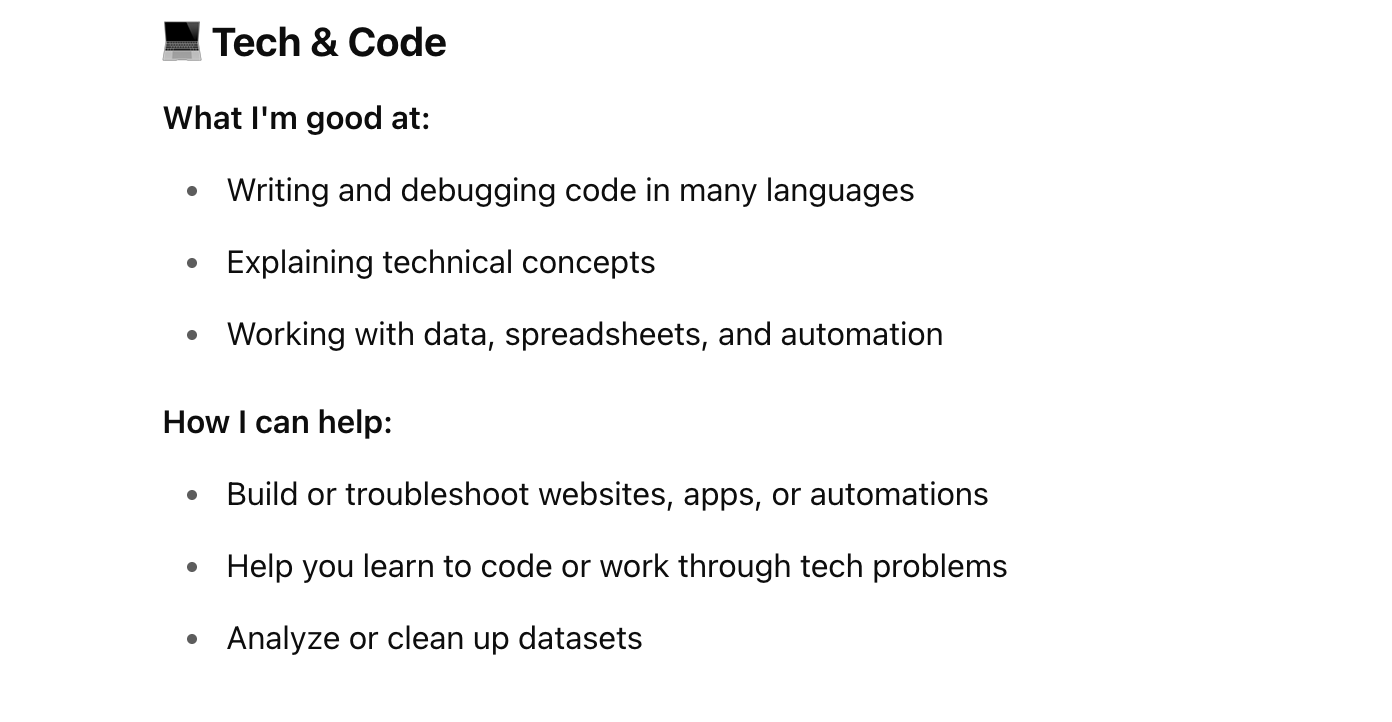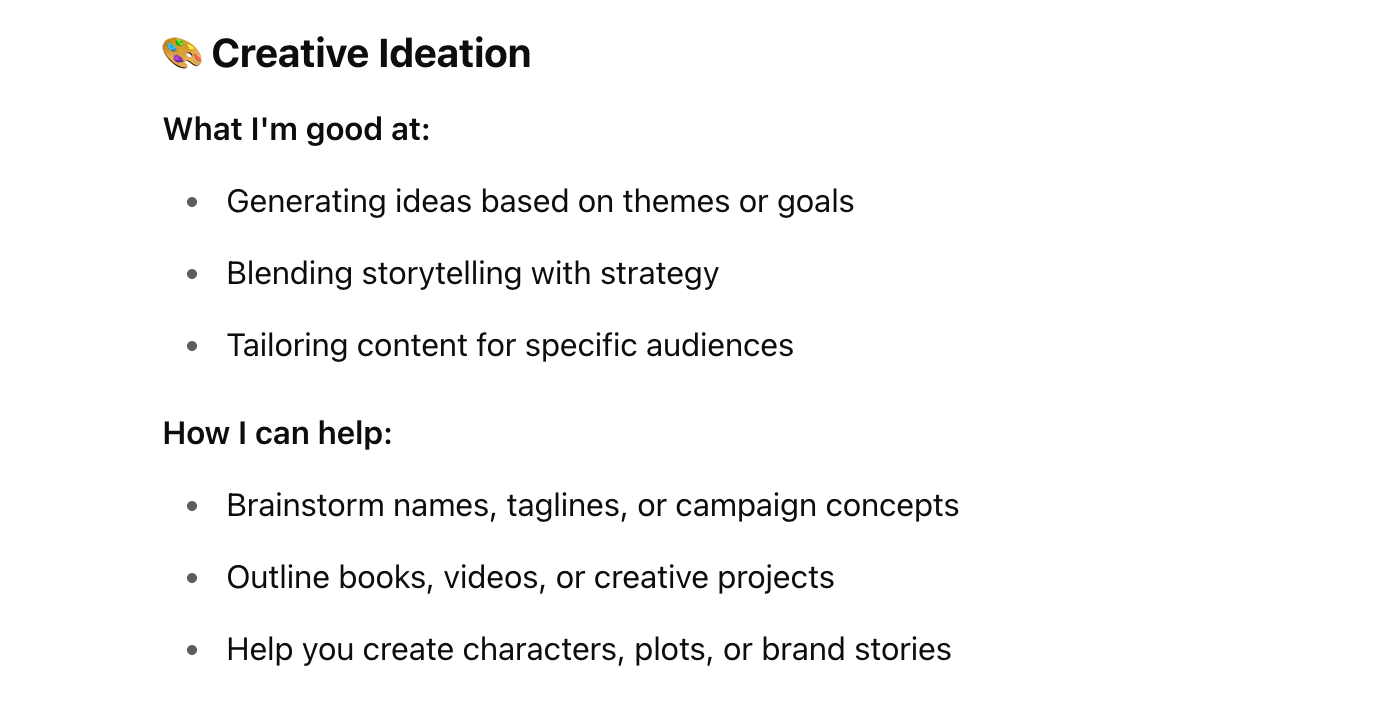AI won't make you irrelevant, your skills will.
Staying relevant in your career when up against AI, a brief reflection on historic workforce disruptions, and knowing when to jump ship.
Tech Bros walked so AI could run
I know, AI is scary. It’s becoming self-actualized, it’s recoding itself so it can’t be shut off, eventually the robots will kill off humanity, but first - it’s coming for your job.
So much of our identity corresponds with what we do, especially here in the U.S. What we do, aka our job, consists of a grouping of tasks that must be completed. You package together certain tasks, and BOOM - you have a job. You get paid to do said job.
I’m all for finding purpose in these tasks, but from an economic perspective, a job is just a grouping of tasks that need to be done and which someone is willing to pay you to do. There are certain skills needed to perform certain tasks for the job. That’s why we go to school and learn from others - we need the skills necessary to perform the tasks associated with the job we’re trying to do. Some skills you learn on the job (OJT - on the job training), from university, some you learn from time and experience, others from trade schools, etc.
Now you bring in AI. AI is good at automating certain things, compiling and organizing information, following rules, researching, etc. There are certain skills AI has that makes it suitable for performing certain tasks… and some of these skills may be skills that you are also good at. Uh oh. TIME TO PANIC. Competitionnnnnnn.
I’m kidding, don’t panic. It is true though. The ironic part is that many tech companies are starting to reduce their workforces and essentially Silicone Valley has worked itself out of jobs. The tech bros walked so AI could run, and now that they’re being replaced by their own inventions things are getting competitive.
While it is intimidating, this is not the first time technological advances have made specific tasks and skills irrelevant. AI is making certain jobs more efficient. It’s faster at compiling information and data than you are. It can spot trends before you’ve even noticed. But that doesn’t mean it’s coming for your job. It’s coming for a specific set of tasks that were previously performed by humans but can now be performed by computers. Some jobs compile more of these skills than others. You might have one of these jobs.
Here’s the thing - It’s not personal. You are more than a set of skills and tasks. As much as I believe there’s meaning behind work, I also deeply believe working is a means, not an end. There are jobs that are disappearing, but there are also incredible amounts of opportunity still and new skills to be learned, you just need to look in the right places.
Not all the jobs are disappearing
AI is not coming for all jobs, and it is also not the only culprit to blame for “disappearing jobs.” There are other trends across the economy that are impacting job availability and wage growth, including private equity, university acceptance rates, job outsourcing and off-shoring, and many other political and economic reasons that I won’t get into entirely. My point is - its not just AI. But AI is a big player.
I read an article in February asking where all the effing jobs are. Read in between the lines, and the author wasn’t looking for just any jobs, they were looking for jobs needing their particular skill set. They were looking for a paralegal job or something like that. Which turns out was not in nearly as much demand as their college program told them it would be. The author is not alone in this scenario - I wish someone would’ve told me how quickly things have changed for recent college grads. The stark reality is that there are way more degree-holders than there are jobs requiring degrees.
Everyone got on board the ship that was set to sail for the land of remote, white-collar jobs, with their degree in computer technology or business administration as the ticket to board. Thing is… the ship is sinking. Degree-holders saturate the job market, meanwhile, blue-collar jobs are begging people to close the laptop and lace up their boots.
People keep asking where their jobs are. Grads are asking where the entry-level jobs are. The worry is everywhere. But, people aren’t really asking where all the jobs went. What they’re asking is…
Where are the jobs that are compiled of the tasks that I want to and can perform with my skills and degree?
Well… how do I put this nicely… the labor and workforce are changing, as we discussed, from AI and other factors. Some skills previously performed by humans are becoming irrelevant. If a job consists of a grouping of tasks that someone is willing to pay someone to do, and if the need isn’t there anymore for someone to perform those tasks then… that’s that. If someone doesn’t need your skill then they don’t need your skill. And if the market is saturated with people all possessing the same skills and degrees, then the value given to those skills will naturally go down.
It is a blow to the ego to hear your skills are not as valuable or relevant as you thought they would be. The pain and feeling of betrayal is real, and I’m not minimizing that. We were told that all we had to do was go to college if we wanted to live the cushy life, and that reality has been ripped out from under us. This ship is sinking under the weight of all these caps and gowns and large-language learning models.
I think I’ve seen this film before…
We are not the first generation to experience disruptions in the job market from new technologies (deemed general purpose technologies), and we won’t be the last. This change is cyclical, history is still repeating itself, and the benefits of change typically outweigh the temporary costs of innovation.
The Printing Press
The printing press was invented in 1439. Before then, there were people who had the jobs of scribing and writing. They played their part in the economy with the skills they had as part of the elite. Education was for the privileged, and knowledge (reading and writing) was highly valued and esteemed.
When the printing press was invented, it created a large and permanent change to the workforce and economy. Once the invention was popularized, the tasks of scribing and writing became less in demand.
Darned printing press.
What also happened? Information became easily dispersed and available to everyone, not just the elite. It created countless new jobs and opportunities for people of all classes, normalized the skills of reading and writing, and moved society forward with a new threshold of ability.
If people had banned the printing press because of the jobs it took away, the world would look nothing like the world we know now.
The Industrial Revolution
During the Industrial Revolution in the 18th and 19th centuries, the economy switched from an agrarian, manual labor-centered workforce to a more industrial and automated machine-centered one. This transition to machines took away countless hands-on jobs. Not as many people were needed to perform tasks, making some skills become obsolete.
What the Industrial Revolution also paved the way for was completely new industries, jobs, and opportunities. The machines and efficiencies that were created led to more innovations, new markets, and higher-paying jobs.
We don’t look back on this time of transition and say to ourselves, “I wish we still harvested wheat by hand.” This may have been a tumultuous time for the wheat-harvesters, but I’m pretty confident they were able to learn new skills and find new jobs.
The Internet
With the invention of the internet, once again, the entire workforce was disrupted. People with manual, middle-skill jobs like researching, travel booking, data entry, and clerical tasks experienced job loss. Things became automated. In-person shopping became less important with the rise of online shopping, leading to store closures and layoffs.
The invention of the internet, like the printing press, also made information attainable to the masses. Anyone could research online, learn new skills, connect with friends and family, job search, amongst the other hundreds of perks.
We all understand the importance of the internet and what it has allowed humanity to accomplish. It may have even had the most impact on people who could not afford to access information in the past. It created avenues for people to obtain knowledge that was never available to them before. Economic mobility became even more accessible, even without a university degree.
The Black Plague
Substack author Carmen Van Kerckhove recently wrote a post about how society has taught us to value and esteem white-collar jobs, and now that those jobs are being replaced with technology we’re facing this identity crisis and death of ego. She discusses how classism in the US has been defined by white-collar vs blue-collar work. The son or daughter who decided to pursue college and a degree in law was more esteemed than the kid who took the electrician apprenticeship. The accountant was praised while the dental hygienist was dismissed. All these kids (including myself) were told to go to college if they wanted their lives to go anywhere and were discouraged from exploring in-person laborious jobs.
The author then discusses the outcome of the Black Plague. After the Black Plague took out most of Europe, affecting peasants and field-workers the worst, the workers who survived suddenly became high in demand. Because of this demand, they were able to break the cyclical poverty of European classism and demand more pay and better treatment from the landowners. She then compares that back to the blue-collar jobs of today.
Sink or Swim
With many labor-intensive jobs going unfilled, the ones who are doing the work are starting to charge 3x what they charged in the past. Traditional blue-collar work has picked up in value due to consistent demand and a decreasing workforce, while recent college grads are still looking for their first office gig 6 months post-graduating. We’ve been reinforced to blindly run after that pat on the back and reassuring nod from ‘professionals’ rather than honestly look at which career paths could produce the results for the lives we want.
We can only guess how all of this will play out in detail, but looking back on the benefits of change throughout history shines light on the positive outcomes it brings. Innovation, short-term job loss, and economic pressures demand adjustment and creativity. What can be painful in the short-term can lead to long-term societal benefit, especially for those previously left out of the conversations.
Creative industries may be destroyed by AI… or they could become more important than ever. AI could enable more innovation or stunt it. Certain jobs might remain untouched by AI, or maybe it can be incorporated in meaningful ways to increase productivity. Anyone has the ability to leverage AI to help them in their career, start a business, research… another tool made available to the masses.
One thing is clear - humans have always adapted to technological changes and we won’t be the first generation to give up and sink.
We may just need to change our perspective on what we deem as the valuable skills moving forward and maybe learn a few things.
Navigate the disruption like a pro
If you feel stuck and are dwelling on the sunk costs of the skills you learned that now lack relevancy, you are not alone and you are not irrelevant. Experience is never wasted, it just needs to be used correctly. String-theory and all that.
So your degree might not be as useful as you thought. Neither was mine. The sooner you accept this the better. That doesn’t mean college taught you nothing! (hopefully)
There are opportunities out there, you’re just holding onto too much to see them.
Here’s what you could do:
Let go of expectations, from yourself and others. If you have incredible dreams for yourself and want to keep pursuing those and stay in the competition, then go for it. Your drive alone can get you far in your career. But if you were pursuing a career because you felt like you should, then you need to let that feeling go. Start by eliminating “should” from your vocabulary entirely. Its liberating. Now look at the paths for what you can do.
Learn how to pivot. You might not have to leave the industry you work in entirely, maybe you just need a new position. You already have the industry knowledge. Or if your industry is dying, take the skills you have to a new one. Ask ChatGPT what kind of work you could go into now. Talk with your friends. Poke around on the internet. There are interesting jobs out there you’ve never even heard of.
There’s nothing shameful about pivoting in your career. You can’t keep holding onto the psychological safety you thought your last job gave you. If people don’t regard your excel skills as highly anymore then you can’t force your pivot table down their throats and demand their respect and money. You couldn’t do that anyway really…
Consider completely new industries. A full rebrand. An in-person laborious job may not seem as glamorous as your old one where you could hide behind a computer all day in your pajamas. But, what it lacks in glamour it makes up for in job-security, benefits, income, work-life balance, and not taking your job home with you. A new industry may not even have to be laborious, but maybe stop only searching for remote work. We’ll talk about growing industries in the next section.
Start contracting. Retaining employees can cost a lot for companies. Large companies have been laying off their workforce lately in the name of efficiency, but that doesn’t mean the demand for your skills is completely gone. It could be that they don’t need your skills all of the time. Companies have been opting into contracting and outsourcing of tasks instead of retaining employees, which means there’s opportunity to be the contractor. This could be the opportunity you’ve been looking for to work for yourself. The “Gig Economy” is booming, and more and more people are opting into independent contract work.
Become resilient. AI might be coming to take your current position, but it’s not coming to take all jobs. The tasks associated with certain titles will start to change and rely more on the ability to use AI to complete the tasks rather than performing them yourself - learn how to apply it in your work.
What we’re currently experiencing is another disruption in the economy and workforce which will require people to pivot, get creative, and learn new tricks. It will require trying and failing, and trying again. It’ll take longer than you think. But don’t give up.
Your existence is literally the outcome of the resiliency of every generation before you. I mean… did you think you just fell out of a coconut tree?
Get up, shake off the dust. Become resilient - it’s what employers are looking for anyway.
Business is booming… in these industries
The economy is changing quickly, and the demand for knowledge and thinking-based jobs is slowing, but not disappearing altogether. Labor-based jobs are still around and beginning to pay better than ever. Many tech-based industries are still growing, thriving, and hiring. The US Bureau of Labor Statistics has information on growing occupations and industries.
Here are some industries that are experiencing job growth:
Renewable Energy (especially tech positions)
Healthcare (in almost every role, especially mental health)
Cyber-security
AI (get ahead of the curve if you can/want to)
Construction Trades (literally all of them)
Animal Care (veterinarians were ranked Indeeds top job of 2025, vet techs, etc.)
Transportation and Logistics
Finance (fairly competitive though)
Many of the growing roles in these industries do not require 4-year degrees and only require apprenticeships or certificates to get started. While these career paths have not picked up much in popularity yet, it is only a matter of time before avenues to obtain the necessary experience will increase in demand.
The World Economic Forum’s Future of Jobs Report 2025 describes some more jobs that are experiencing growth and which jobs are experiencing decline.
Conclusion
If you’re worried about your job becoming irrelevant, then you essentially have two options:
Adapt with the industry and learn new skills/how to apply AI.
Pivot and consider different career options and learn new skills.
Bonus: Learn new skills.
It’s true, AI will replace lots of jobs, and this change in the workforce will be experienced quicker than any economic changes experienced before this. Luckily, there are resources out there to help you navigate these changes, including AI. An easy prompt to put into an AI bot, such as ChatGPT, is asking how to pivot in your career with the experience you have in order to land a role that is higher in demand in the job market.
I’m not too worried. Humans will always be necessary. What I’m worried about is the people who will sink with the ship rather than find something new to sail on. There are jobs out there. You might not initially see the full value in them, but other people (read employers) will, and they’ll pay a lot for their skills.
Stay relevant out there, friends. ✌️



